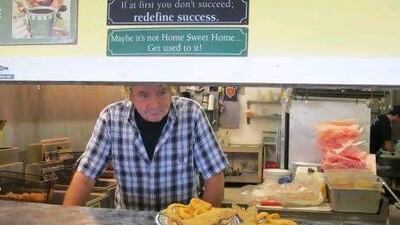PEORIA, ILLINOIS // "Yeah, Peoria is famous for bein' Peoria," said Tammy Senti, as she sat in front of her family's cafe on a rocking chair greeting the lunchtime rush. "The most average city in America."
Peoria has become a metaphor for the middle-American good life and the averaged-out sweet spot of "main street" opinion that all politicians and marketing professionals aim to hit. "But will it play in Peoria?", they have asked for decades.
That Peoria used to be a real place. Companies would test their products here and gauge opinion in countless local focus groups before sending novel flavours of soda or disposable nappies nationwide. The research companies have left Peoria over the past 20 years; its demographic mix no longer quite so average.
But in other ways, Peoria and the experiences of its people are emblematic of small cities and towns all over the country's Midwestern heartland that have struggled to right themselves amid the turbulence and uncertainty of recession.
Ms Senti has run the business side of the 50s Diner along with her husband Scott, who manages the kitchen, for the past 21 years. "It's honestly something of an institution around here," she said. "Those two eat here at least twice a day," she said, pointing to an elderly couple walking in. As Ms Senti sat outside during a break, it seemed she knew every patron coming in and out of the cafe, and listed what each would probably order for lunch.
The postman walked by, teasing Ms Senti: "Looks slow today, maybe the debate scared them off," referring to the previous night's presidential debate.
Unlike in Chicago, where President Barack Obama is unquestionably the favourite, or in rural southern Illinois, where his challenger Mitt Romney rules, Peoria seems to be a reflection of the current neck-and-neck contest, with lawns of the city's bungalows seemingly split evenly in their display of signs backing either candidate.
Inside, sitting at their usual booth, middle-aged sisters Janet Stortz and Barbara Martin, like many in the cafe, are discussing the elections. Ms Stortz, comes to the 50s kitsch-strewn restaurant every Sunday with a group of friends for breakfast; the waitresses always have her vanilla diet Pepsi on the table before she sits down. "Personally, I don't like Obama because of his health plan …" Ms Martin said before her sister cut her off: "But I don't even have benefits. Obama all the way."
A rotund man walking by their booth stopped to listen before announcing loudly to the entire dining room "Vote for Obama".
The 50s Diner suffered at the beginning of the recession, but has become relatively profitable again, says Scott Senti. But he doesn't expect things to really get better. The number of patrons that come in daily for his chicken fried steaks and pancake breakfasts has risen, he says, to an average of 600. But even then, his margins are a fraction of what they were.
"The cost of food is what kills you, and it's not just what happens in the US that matters anymore," he said. "All of a sudden there's a drought or a hurricane in Mexico and no feed for pigs, not enough cattle."
Mr Senti also says that he can't compete with the many restaurant chains that have moved in to Peoria's malls. Out of the 20 restaurants nearby, he says that only one other is locally owned.
"For a while people were going nuts, adding swimming pools," he said. "Now people can keep their head afloat, but they just can't get ahead."
Mr Obama, he thinks, would raise taxes and put him out of business. "We'll end up like Europe," Mr Senti said. Before Peoria became a metaphor, it was mostly known for its gambling and other vices, and its raucous Vaudeville stage shows - the origin of the "But will it play in Peoria?" phrase. Al Capone and local gangsters once fought for control of its lucrative rackets. The city sits on hills that tumble toward the Illinois river, where an old paddleboat casino still plies the mile-wide waters.
Aside from the world headquarters of Caterpillar, the world's largest heavy machinery manufacturer, downtown Peoria seems empty and rusted over. Some buildings have boards over their windows and even an attempted revitalisation of the historic waterfront seems to have withered after only a block of bars and restaurants.
The city gave money to private investors to build a new baseball field for the local minor league team, in the hope that it would bring new businesses to the area. But the old brick warehouses and factories nearby, that in other cities would be converted into swish lofts and galleries, sit boarded up or underused.
The poverty rate in Peoria is 19 per cent, well above the 15 per cent national average. At 9.6 per cent, unemployment is also higher than the national average of 7.8 per cent.
People talk about street crime in places they never expected to see it, and the police battle a gang on the city's south side called the "Bomb Squad".
Despite his own problems, and the city's, Mr Senti is optimistic about the future. "Man, if they get gas prices in line and taxes down, this place will take off again," he said. "It's got something for everybody."
But not everyone agrees. Jeremiah Schmillen, who owns the Broken Tree Cafe across town, says: "The decline started a long time ago," he said. "The population has been shrinking since the 1970s. The smartest, most creative kids always leave."

